.
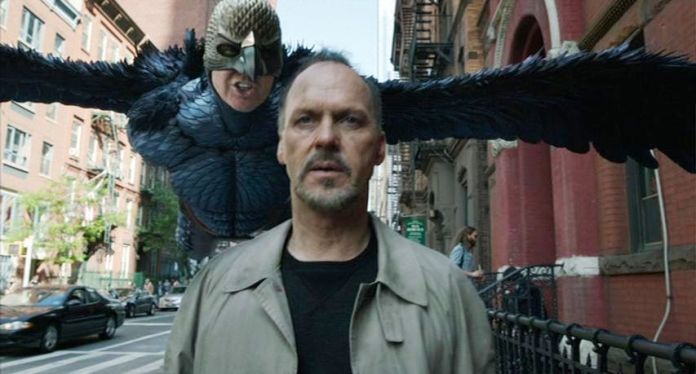
.
Director/Coscreenwriter: Alejandro Gonzalez Iñárritu
By Roderick Heath
Most filmmakers portion out what talent they have in small, polite courses. Alejandro Gonzalez Iñárritu throws messy, teetering banquets every time. Since his debut with 2000’s Amores Perros, Iñárritu has made technically bravura, deeply felt and seriously intended works that push at the edges of narrative cinema, sometimes to the limits of credulity and patience. His second film, 21 Grams (2003), was radically told soap opera. His Oscar-nominated Babel (2006) displayed all of his best and worst traits—intense and vibrant portraiture of characters and the worlds they live in, conveyed with powerhouse cinema, tied together with threadbare contrivances and inchoate emotional connections and impulses. Iñárritu has been quiet for some time since his bruising break-up with his screenwriting collaborator Guillermo Arriaga—only the exhausting, Spanish-made drug-addiction drama Biutiful (2010) was released in the interval. Now he’s come roaring back to prestige-clad attention again with Birdman, or (The Unexpected Virtue of Ignorance), a film that seems intended to give Iñárritu’s rival in the Latin-American wunderkind stakes, Alfonso Cuaron, some more competition. Following Cuaron’s showy technical extravaganza Gravity (2013), with its epic-length shots and special effects, Iñárritu ripostes with a more earthbound drama that nonetheless one-ups Cuaron by offering a film that affects to be composed of one, constant, driving shot.
.
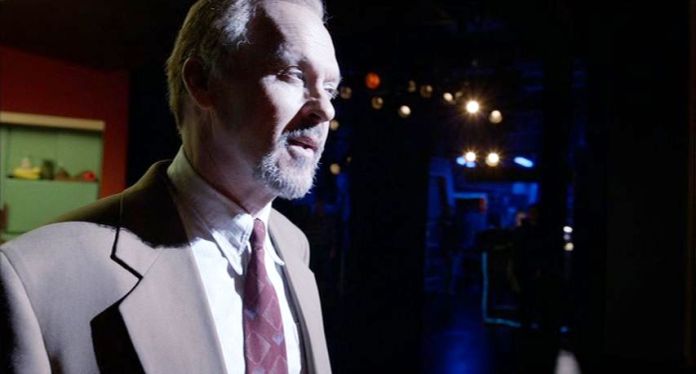
.
Iñárritu uses this device to illustrate the drowning wave of anxiety and detail that threatens to swamp his protagonist, actor Riggan Thomson (Michael Keaton), who’s directing and starring in his own adaptation of Raymond Carver’s What We Talk About When We Talk About Love. Riggan is a former movie star, famed for his part in the “Birdman” franchise of nearly 20 years earlier, and he feels like he sacrificed too much of his credibility and talent for a paycheque. Now he is dogged by the alter ego by which too much of the public knows him, constantly hearing a droning, mordant voice mocking his efforts to reinvent himself as an artist, his Birdman characterisation become his personal daemon.
.

.
Riggan has managed to pull together the theatrical production and steered it to the very threshold of opening in the St. James Theatre on Broadway, but has just realised how bad his supporting male star Ralph (Jeremy Shamos) is. By serendipitous fortune, or perhaps contrivance, a lighting rig falls on Ralph’s head during a rehearsal, badly injuring him. Riggan has to find another actor quickly. He consults with his lawyer and confidant Jake (Zach Galifianakis) and rattles off a list of potentials, like Woody Harrelson and Jeremy Renner (“Who?”), but they’re all busy playing the current wave of superhero films. Costar Lesley (Naomi Watts) suggests her boyfriend, Mike Shiner (Edward Norton), an actor of the stage who has great critical favour and a reputation for uncompromising artistry—that is, he’s a pain in the ass.
.
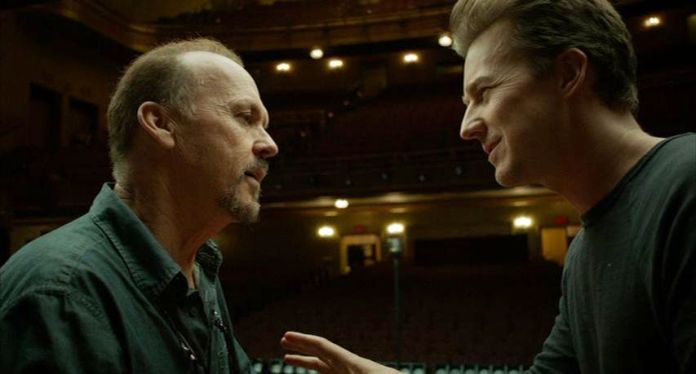
.
Because he knows Riggan’s play inside out from helping Lesley rehearse, Mike is able not just to slip quickly into the role, but also immediately coax Riggan to make improvements. Riggan is delighted at first with his new costar, but soon Mike’s loose-cannon ethic starts to make Riggan’s situation feel even more nightmarish. Iñárritu has described himself as a frustrated musician, and he once composed scores for Mexican films before he broke through as a director. The intimate flow and relentless tug of music is clearly what he’s after here, translated into visual terms. The constant sense of headlong movement created by his tracking shots is matched to a syncopated jazz drum beat, lending a neurotically arrhythmic yet propelling heartbeat—at one point, the drummer is even glimpsed as a busker outside the theatre and then, later, inside, playing merrily in the theatre’s kitchen. The cumulative effect of this scoring suggests just such a nerveless, neurotic beat has invaded Riggan’s ear and won’t leave it. Iñárritu’s camera aims to transform his chosen setting into a multi-levelled, pan-dimensional stage, sweeping up and down stairwells, in and out of the most cramped confines of the theatre, and out into the expanse of the Manhattan night where crowds reel and neon blazes.
.
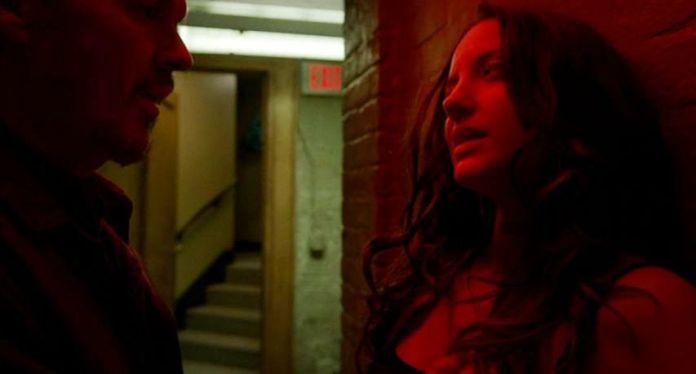
.
Iñárritu records the teeming, electrified ambience of this location in a way that few recent films have managed, recalling classic works whose grungy-glamorous portraits of urban gods captured both the city’s boiling, stygian ferocity and vigour, a crucible of possibility—movies like Sweet Smell of Success (1957), as well as the specific canon of Broadway films like A Double Life (1947), All About Eve (1950), and The Country Girl (1956). In Birdman, powerful theatre critic Tabitha Dickinson (Lindsay Duncan) sits in a solitary vigil with pusillanimous pen poised for takedowns in a nearby bar, recalling Sweet Smell’s savage columnist J. J. Hunsecker, whilst Riggan seems to be threatened with a schizoid breakdown along the fault lines of the real and fictional persona like Ronald Colman’s Anthony John in A Double Life. Riggan keeps moving because, like a shark, he’ll die if he stops—he’s invested all his money into the production. His actors share and amplify his brittle, egocentric, dedicated gusto, particularly Laura (Andrea Riseborough), who’s also his girlfriend. He recounts to Mike his “origin story” and its connection to this obsessive venture: as a young performer in a school play, Riggan impressed Raymond Carver, who sent a congratulatory message backstage to him written on a bar coaster, inspiring Riggan to choose acting as his career. Mike ripostes by noting this clearly indicates Carver was drunk at the time.
.

.
Riggan’s daughter Sam (Emma Stone), a recovering drug addict who’s just of out of rehab and is working as Riggan’s PA, stands outside of the stream. She’s angry at her father for his false promises as a parent and has been inoculated with a raw and cynical understanding of this niche world, plainly contemptuous of her father’s hoped-for redemption via art in a scene that’s scarcely relevant beyond a few city blocks. She lets loose this contempt on Riggan after he confronts her about smoking dope. Mike, on the other hand, is deeply impressed with his own integrity as anointed artist-hero who brings edge and danger to the stage, and constantly tests the limits of Stanislavskian realism. He erupts in a fury during a preview performance when the real liquor he’s been drinking proves to have been replaced with water. During another preview, when he and Lesley are being wheeled on stage in a prop bed, Mike, in the thrill of imminent performance and momentarily overcoming the impotence that’s been besetting him, attempts to ravage Lesley there and then. Lesley, appalled and infuriated, promptly breaks up with him, and when Laura consoles her, they lock lips, caught up in the whirl of passion. Mike further antagonises Riggan by giving an interview where he steals Riggan’s Carver anecdote, and postures as the saviour of the show.
.
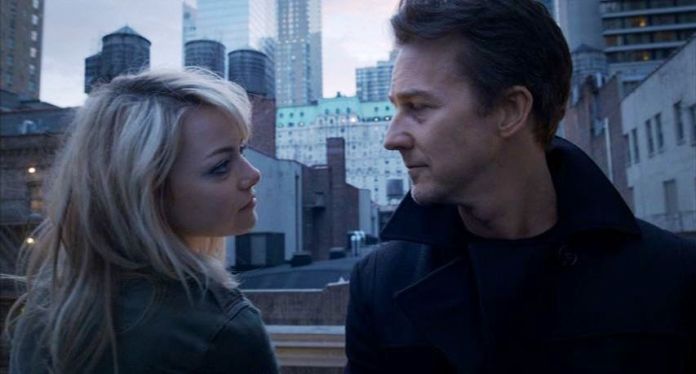
.
Mike is often insufferable in this manner, but also candid and committed in his bullshit artiste way. He tries to warn Riggan that he’s headed for a fall, locked on the wrong side of a perceived opposition between artist and mere celebrity. Mike reveals a far less aggravating side as he forms a bond with Sam, whom he encounters at her favourite hideaway, perched on the edge of a balcony high above Broadway, ironically calling to mind the similarly poised, detached yet omnipotent Batman that Keaton played a quarter-century ago. Mike is drawn to the damaged and sceptical young woman, and seems almost like a different person when calmly admitting his fears and faults to her, though his attempts to convince her of her worth are met with good-humoured derision. Nonetheless, the sideways-glimpsed romance between Mike and his daughter adds another worry to Riggan’s already overloaded psyche. Riggan is having semi-hallucinatory experiences, introduced at the start when we see him floating like a bodhisattva in his dressing room, and then seeming to use superpowers to move objects and, eventually, trash that dressing room—except that when the camera steps back and takes on a more objective viewpoint, he’s revealed to be smashing things the old-fashioned way. Finally, the mocking voice is revealed to be Riggan in his Birdman guise, sweeping down through the city streets to preach like Mephistopheles the gospel of entertainment and the security of low expectations with high pay.
.

.
Casting Keaton as Riggan was a coup of uncommon fortune for Iñárritu, giving him as it does a legitimate hinge not just of performing ability but potential satiric and thematic impact. Keaton’s stint as Batman was his apotheosis as a movie star and also the start of a long wane, though he’s long been a difficult actor to contain, too impish and odd to make a standard leading man, too self-contained and nonchalant to behave as comic fount. In a similar way, Iñárritu’s other actors are cast to play off associated roles; Watts’ pash with Riseborough clearly is a skit based on Watts’ breakthrough role in Mulholland Drive (2000), whilst Norton plays a variation on his public persona. Such conceits are entirely understandable in a film that is both about theatricality and possessed by it. The way Iñárritu films his actors and lets them combust in big, showy spiels and set-piece rants may only indulge rather than critique that theatricality, but there’s nothing much wrong with that, especially as it all contributes to the hothouse atmosphere and, moreover, delights in acting, raw and untrammelled, as the ultimate source of spectacle, both on stage and screen. Iñárritu lets his actors go wild with their tools just as he’s doing with his camera.
.
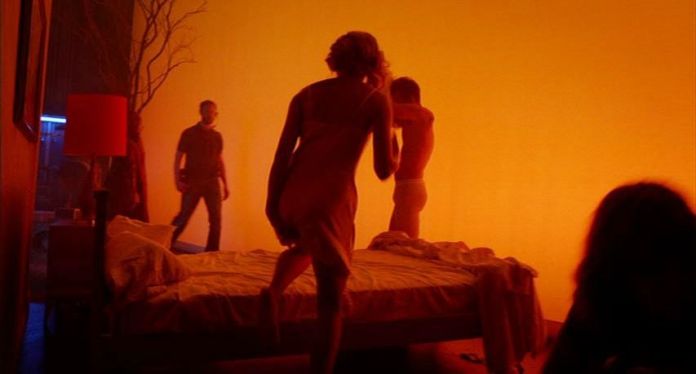
.
Meanwhile, Iñárritu manages a cunning and sinuous control of tonal shifts whilst never seeming to demarcate his moves officially, leading from farce to drama to elegy through virtuoso manipulation of elements and the connective sinew of Antonio Sánchez’s score. Riggan’s encounter with a hot-to-trot Laura in the lowest hallways of the theatre sees her transformed by lighting into a sultry and beckoning sylph in the labyrinth, then the camera follows her up to the stage, segueing into the first preview performance where a tone of elegy dominates, the tone Riggan wants for it, until Mike suddenly violates the mood with an outburst. Iñárritu cues a shift from hyped-up intensity to punch-drunk eeriness after the dispiriting impact of Sam’s excoriation of her father and his bleary, defeated suck on her worn reefer: the camera slides out and across the stage in the midst of dry ice and blue light, picking out Laura as a ghostly figure in mid-flight of elegiac speech in one of Riggan’s stylised dream sequences. A trip out the door of the theatre plunges first from exhausting claustrophobia to the mad tumult of the street to the shadowy and sheltering refuge of the bar. A quick recourse to a salving cigarette shimmers with a sense of relief and relaxation. Mike and Sam making love on a catwalk high above the stage sees camera hover and then float out above the actors at work below with swooning romanticism falling into gentle diminuendo. Iñárritu almost wills style into substance in such pirouettes, lending his vision of this hothouse of creation the quicksilver changeableness of creative vision and dramatic mood.
.
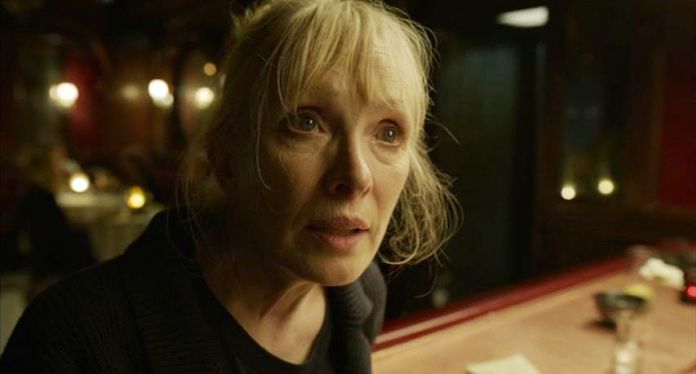
.
As a statement about the soul of the actor and the eternally tendentious nature of creative endeavour, Birdman works best through such epiphanies and flourishes of stagecraft, transforming mundane realities into mimetic canvas where Riggan’s terrors and inspirations collide and crossbreed. The problem here is that when one examines each facet, the film seems composed of a great mass of clichés. The washed-up star striving for a second chance. The sassy, irate, burn-out celebrity’s daughter. The young tyro prick. The nutty, oversexed actress. The vituperative critic who has appointed herself as guardian of culture determined to cut down our hero. It’s worth noting that 2014 has seen a small glut of films that seem like obvious metaphors for their makers’ troubled relationship with the business of art, the demands of family, and the pundits who approve or dismiss their work; there’s a strong undercurrent of this in Mike Leigh’s Mr. Turner, John Carney’s Begin Again, and Jon Favreau’s lightly comic Chef, which strained to transfer the theme onto the world of celebrity cooking. Birdman shares with the last two films the figure of the unruly, ageing male talent and his efforts to balance a relationship with a child against renewing artistic success. Yet Chef was more sophisticated and accepting than any of the more self-righteous and noisy versions, particular when it came to the hero’s relationship with his critic-antagonist, who curiously pointed out that their battles on Twitter were “theatre.” Iñárritu, bluntly and ridiculously, portrays Dickinson as an outright creep who announces her intention to destroy Riggan’s project for even daring to try.
.
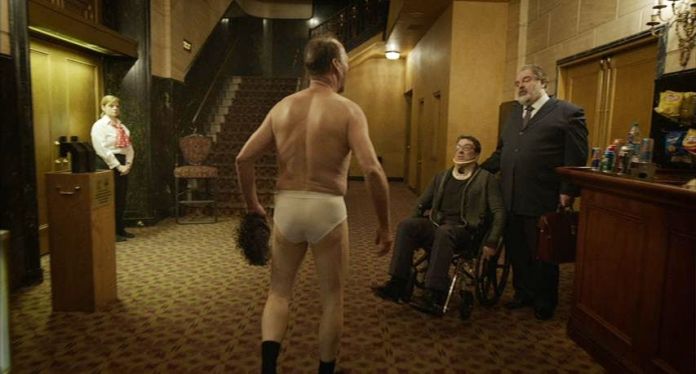
.
The best defence one can offer is that Birdman is an exercise in cut-up aesthetics, an extended jazzlike improvisation based in stirring, familiar melodies and refrains that reflect the distorting intensity of such a feat as Riggan is intending. We could accept the film’s stereotypes and cornball ideas as mere extensions of his enthused, but not terribly original mind—and I would, except Iñárritu’s technique, wonderful as it is, subtly foils his excuse, as he readily leaves behind Riggan’s viewpoint when he feels like it. This isn’t exactly a deal breaker in terms of the film’s worth, especially as Iñárritu and his cast make the characters vibrate with such energy and offer many segues of contradiction and surprise. More problematic is the film’s approach to the art it portrays. Unlike the makers of such stalwart works of artist-meltdown portraiture as 8½ (1963) and All That Jazz (1979), Iñárritu doesn’t suggest much deep knowledge or interest in the art form he’s portraying, and scarce interest in whether Riggan’s boondoggle project is worthwhile; reasonable questions about just how worthwhile this project is are subordinated to an imposed desire to see Riggan win through. The snatches we see and hear of Riggan’s adaptation may strike one as effectively stylised and lyrical or stilted and graven, and there are dancing reindeer in his dream sequences, which, in spite of what Laura says, isn’t a good idea.
.
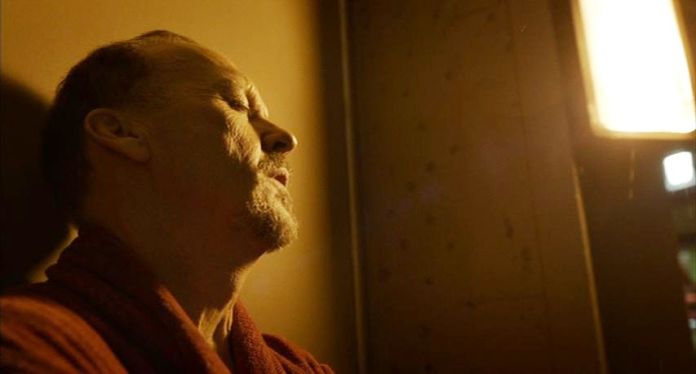
.
In terms of artistic commentary and perspective, Birdman poses as specially relevant to the moment: it mentions superhero movies. But its cultural presumptions are actually passé. Iñárritu’s idea of cutting-edge satire of actor vanity is to show Riggan pulling off his wig. Appearing in superhero movies might have hurt the careers of some actors in the past, but the idea that it’s some sort of ticket to serious career oblivion is dated. Perhaps if Iñárritu had cast a more obviously limited actor than Keaton, some classically bland leading man crumpled by time and anxiety, his points might have landed with more urgency and specificity. When Tim Burton cast Keaton as Batman, he did so precisely to avoid cliché about square-jawed heroes, a subtlety that seems lost on Iñárritu, who plays up the presumed entrenched dichotomy between capital-A Art and lowbrow fantasy with thudding simplicity as food for the sorts of self-congratulatory pseuds Riggan’s supposed to be battling. Theatre critics line up to bathe in the aura of celebrity like everybody else these days, and Hollywood stars regularly use the Great White Way to give their careers a retooling.
.
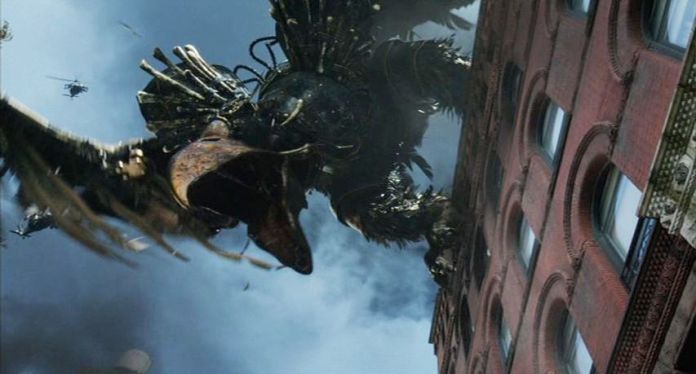
.
Iñárritu does fruitfully use his dichotomy at one interval, when Riggan’s Birdman alter ego finally appears and unleashes a wave of blockbuster destruction, offering the balm of such regressive but buoyant destruction fantasy as a cure for the terror of “seriousness,” an eruption of Michael Bayisms that scarcely feel out of place in this work’s sturm und drang. Riggan responds with his own, stripped-back fantasy of flight, evoking Marcello Mastroianni’s escapades as a kite in 8½. Birdman needed to embrace its inner Robert Altman film more, given flesh to the potential in Riseborough and Watts’ characters, and kept the film a grand extravaganza of comic types crashing against one another. Because Birdman steadily loses steam in spite of its propulsive method, as the conflicts of ego and temperament that pop and fizz so well in the first half give way to more sustained contemplation of Riggan’s hapless state. This doesn’t work very well as Riggan isn’t that detailed or empathetic a protagonist: there’s no sense of who Riggan was before Birdman—did anyone ever take him seriously as an actor?—and his major failings, including infidelities and neglecting of Sam and his warily understanding ex-wife Sylvia (Amy Ryan), are all safely vague and past. Also bordering on inane is the subplot where one of Riggan’s antics makes him an online superstar, with Sam translating and exploiting for the social media sceptic the power he doesn’t yet understand. This element feels shoehorned in (again, Chef actually did this better), perhaps to make sure we know the film is set in the present rather than in 1965.
.
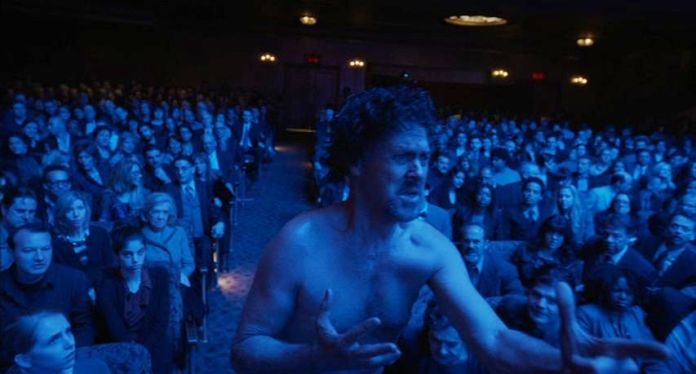
.
The constantly unstable sense of reality certainly invokes the Latin-American traditions of magic-realism, with which Iñárritu, a fan of Borges and Cortazar, is clearly conversant: most every moment tingles with the mysterious, transformative energy of the imagination, or maybe lunacy. Time folds in upon itself, reality bends to one’s will, invented personae torment their creators, and dream states infuse and upend all certainty. But Birdman may be viewed best as a screwball farce, as much a lampoon on the idea of artistic endeavour as anything else, sharing more in common with the Marx Brothers of A Night at the Opera (1935) and Room Service (1938), the early scenes of Some Like It Hot (1959), and Looney Tunes than Fellini or those old Broadway films. The script is littered with good lines, like Riggan’s furious self-description as Birdman prods him to return to the cape: “I look like a turkey with leukaemia!” Even if Iñárritu isn’t a comic filmmaker of great finesse or originality yet, he still manages to pay off with some sequences of slapstick zest as well done as anything I can think of recently, particularly when the infuriated Riggan drags the supposedly ascetic Mike out of his sunbed in a rage over the newspaper interview and starts a fight. Norton reveals surprising comic grace as Mike scrambles and flails like Jerry Lewis cast as hapless henchman. One sustained sequence varies a very old bit of comic business, as Riggan steps outside of the theatre’s rear entrance for a smoke during his break, only for the door to swing shut and catch his bathrobe: Riggan is stranded outside, and forced to dash in his underwear through Times Square and back in through the front entrance of the theatre, with enthused tourists and gabby New Yorkers taking photos of him all the way. Inside, he has to dodge Ralph and his lawyer who have come to try and squeeze money out of him, and once he gets back into the theatre, has to start acting a scene from the aisle, a disaster that becomes gold as the audience is wowed by the unique staging and Riggan’s seemingly raw and risky playing.
.
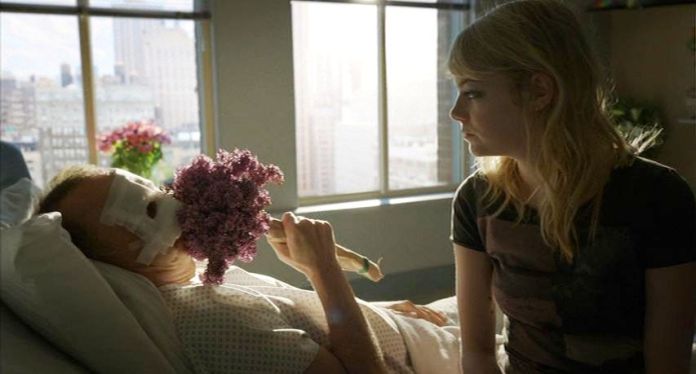
.
Fittingly, the film’s climax is based on another old showbiz joke, one memorably used by the Looney Tunes cartoon “Show Biz Bugs,” with its immortal punch line “I can only do it once!” as the artist self-conflagrates on stage, totally breaking down the barrier between act and deed. Frustratingly, though, Iñárritu can’t quite commit to the joke and its black comedy triumph and gives a coda that offers instead triumph through going above and beyond in a not-too-costly fashion. In a crowning visual joke, Riggan, masked by dressings that resemble his Birdman guise, has become the hero at last, but only in the most ironic and self-punishing of fashions. Although farce is the official frame here, on another level none of this is a joke, but rather an attempt to articulate flurrying artistic worry and ecstasy with deadly, transcendental seriousness. Riggan’s climactic gesture is offered as an ingenious as well as tragicomic solution to his quandary, an act of daring that can wow even the most jaded or hateful. Except that it would fairly be taken as a sign of deep mental illness in real life, and indeed Riggan may well be ill. Either way, Birdman‘s very end obfuscates too much. The film’s weak and shop-worn ideas can’t be entirely forgiven when it yearns so badly to say something of substance. Yet Birdman still counts as a major work of cinema purely because it loves cinema so much, and evokes that line of Orson Welles’ about a movie studio being the greatest toy train set a kid ever had.

Inarritu’s films, for me, always seem on the surface to be about a whole lot more than they actually are. In BIRDMAN, the dazzling camerawork, the driving jazz score and the intensity of the performances all imply a life -or-death level of urgency that the rather banal story doesn’t merit. I was deeply disappointed by it, but I enjoyed your thoughtful review.
LikeLike
And yet the pleasure of Iñárritu’s films lies to me precisely in that driving intensity, Pat; the vibrancy of the surface is its own point, and to a certain degree that’s enough. But yeah, only to a certain degree; it’s hard to ignore just how banal some of this is. Riggan’s confrontation with Dickinson was the worst kind of straw man dramaturgy, suggesting Iñárritu’s great dream is less a world of cultural dialogue than of clearing the way for his own monologue.
LikeLike
Fair enough, Rod – and, in retrospect, I was a bit harsh. I did like the way Innaritu perfectly captured the authentic atmosphere of the theatre district/Times Square area of NYC and that’s what staying with me 2 days after seeing the film. Some fine acting, too. But ultimately, not a lot of substance.
LikeLike
Agreed.
LikeLike
Just got to it yesterday. One of those movies that I’m fully engaged in on an artistic level, but that slowly deflates along the way, as the pileup of cliches become too much for the conceit (fever-dream camera barreling forward in this case) to sustain. So many great performances to hang onto. But the final moment/facial expression asks us for too much: that we should accept Riggan’s dementia as a version of heroism instead of pity him or, God forbid, actually pull him out of the deluge of his neuroses. I felt for this guy, have even been him once or twice or thrice, and the last thing I needed was for someone to believe me when I said I had superhuman powers – when what I needed was help. All that aside, you’re right, the movie is a major work of art that, while your inside its mind, fills you with the perverse thrill that can only come from near failure at reaching too far. (Extra bonus points for somehow not mentioning the film’s half-sister “Black Swan” – cause who needs to be reminded of that sad mess! This film builds up to a much greater statement using many of the same show-biz cliches.)
LikeLike
I can only agree with you, Robert. I took Riggan’s flights of fancy as metaphor for his driving creative urge, constantly erasing and remaking aspects of truth he couldn’t handle, and that the very end was the sign that at last Sam could finally join in with his vision. But I don’t blame others for interpreting it as rank lunacy — my father thought so like you — and that the film didn’t know where to draw the line. And it’s not real ambiguity either, just a kind of opportunist indecisiveness, a “let’s keep ’em guessing” approach that’s just bullshit. I did of course think of Black Swan when watching it, but the arguments about that I’m not keen on opening up again as you say, and besides, it didn’t invent this sort of tale. Great filmmaking throughout that is its own point, but yeah, its main problem is that it offers such great pleasures on the level of farce but keeps showing signs that it wants to be taken seriously on another level it just doesn’t earn.
LikeLike
I actually watched this movie a second time (a rarity for me). On second viewing it dawned on me that the visual technique is partially responsible for the seemly mundane plot. The film feels stage bound, like watching someone’s phone camera recording of a Broadway show. Without edits to give each scene a pace and bring events into focus the film the story feels like it plods along while the film itself feels almost as if it is breezing by at a very fast pace. It is the dichotomy between the slow developing story and the fast paced dialog and mise-en-scene that drew me back for a second viewing. I liked the movie a lot more than Roderick and in hindsight feel like a less conventional plot may have been a distraction from (as Roderick pointed out) a major work of cinema.
LikeLike
Well, Eric, I thought I liked it just fine without being over the moon about. But you do have a point — the style might not leave a huge amount of space for subtle nuance and surprise, but it does offer the magic of watching an extended, as-it-happens performance; as with stage performing, there is no escape from the omnipresent now.
But I still feel no need to let Inarittu and company off the hook for placing themselves in the position where all they could explore were received ideas and cliches.
LikeLike
Lol. Bad punctuation use on my part. My comment should have read “I liked the movie lot, even more than Roderick,” instead of “a lot more than Roderick.” Great review as always. It was this review that made me go see the film in the first place and, as usual, you were spot on.
LikeLike
Ha, fair enough, Eric. I’m glad I inspired you to see it. Birdman, for all I’ve critiqued it for, is above all a movie to be experienced as an experience; it wraps you in its little world with such enthusiasm and skill, and not enough films try for that.
LikeLike